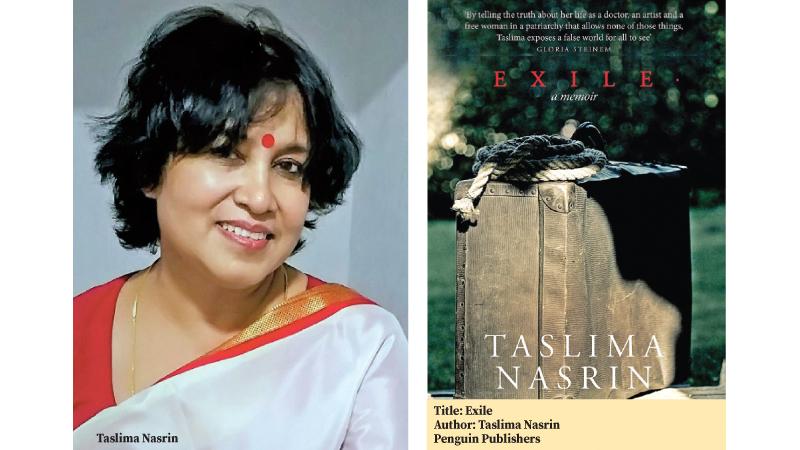
Taslima Nasrin, Bangladeshi – Swedish writer, born on August 25, 1962, is known for her writings on women’s oppression and unflinching criticism of religious fundamentalism. She was forced to leave her country in 1994 and West Bengal in 2007, where she spent some time after being banished from Bangladesh.
Though she received multiple fatwas calling for her death and some of her books are banned in Bangladesh, she continues to write and publish. Nasrin produced more books in recent years. Her books have been translated into 30 languages worldwide.
Her new book Exile is a memoir which bears a testimony to her outspoken criticism of religious fundamentalism and specifically focuses on her banishment from West Bengal.
The book is introduced as follows on the book cover:
 “On November 22, 2007, the city of Kolkata came to a rude, screeching halt as a virulent mob of religious fanatics took to the streets. Armed with a fatwa from their ideologies, the mob demanded that Taslima Nasrin leave the city immediately.
“On November 22, 2007, the city of Kolkata came to a rude, screeching halt as a virulent mob of religious fanatics took to the streets. Armed with a fatwa from their ideologies, the mob demanded that Taslima Nasrin leave the city immediately.
While the police stood watching, mere dumb witnesses to such hooliganism, a morally, intellectually and politically bankrupt Left Front government, tottering under the strain of their thirty year old backward looking rule, decided to ban her book and drive her out of the city she has always considered her second home.”
“This inextricable nexus of petty political conspiracies, vote bank politics and minority appeasement saw Taslima being hurriedly shifted, first to Jaipur and then to Delhi, confined to an obscure safe house, and facing incessant pressure from senior officials and politicians to leave India. Set against a rising tide of fundamentalism and intolerance, Exile is a moving and shocking chronicle of Taslima Nasrin’s struggles in India over a period of seven months.
Dark, provocative and at times surreal, this memoir will resonate powerfully with readers in the present sociopolitical scenario.”
Exile is another feat of his writing career. The book was translated from the Bengali by Maharghya Chakraborty who is a PhD scholar, Centre for Studies in Social Sciences, Calcutta and avid cinephile and fledgling translator.
The book includes excerpts of Taslima’s Diary too which reveal many behind the scene occurrences. Her December 6, 2008 diary entry writes:
“December 6
“Today was the fifteenth anniversary of the demolition of the Babry Masjid. I had written Lajja fifteen years back.
How time flies! Bhalobasa was born fifteen years ago, on December 6, 1992. Apparently, some members of the party Harkat - ul - Jihad have entered Delhi in a car today through Deoband in Uttar Pradesh. Their objective – to cause massive bomb blasts in certain key, heavily populated areas in order to intimidate people. As far as I remember, the Harkat – ul – Jihad had originally been formed in Bangladesh at the height of the Islamic radical’s protests against me. I am yet to fathom how taking innocent lives benefits the agenda of these people.”
(Pages 149 - 150)
And there is a poetic type of writing too, namely Poems from a Safe House. An excerpt:
“3
“Nowadays when I wake up at three in the morning, I no longer get annoyed. People say a restless night invariably spoils the day. But how does that even matter? As if my days and my nights have a reason for being! They laze about quietly instead, one snuggling into the other, nearly indistinguishable. When the boundaries between life and death become blurred, petty things like time and space hardly make sense. I would not be able to pry life apart from death now, nor would I be able to coax death away from life, even if I tried.”
(Page 115)
 “11
“11
“If I wish to stay in this country, I must obey their dictums. I must be quiet and stay how they want to keep me; in a prison, alone. For how many years? No one knows for certain, and neither is it clear if I will ever have my life back.
“But why is the room locked? Because there will be death and devastation if I step out.
“I flinch. People will die because of me? They say yes. I tell them to let me go, to prove how wrong they are. People believe all these arrangements are for me, that the security is to keep me alive. It is perhaps a universal rule that some people always have to lose their way in the darkness for others to feel secure.
My incarceration is making some people feel secure; it is making them feel extraordinarily safe.
“Sometimes I feel the urge to find out who these people are? Are they from the streets or from the colourful town houses? Are they real people or just a catalogue of customs in human form? For whose safety do I challenge death every single day?”
(Page 119)
Exile is an interesting and literary book to read. There are 10 chapters in the book, which include essays, reminiscences, conversations, poems, diary excerpts and poetic type prose.
The first paragraph of the last chapter of the book, No, Not here! Elsewhere! In Another Land! says:
“In the end, I had to leave India. It was my decision entirely, though it’s not as if I had a choice at the end of the day. My blood pressure, constantly fluctuating, had taken to this macabre dance which was wreaking havoc on my system.
It was not even dependent any longer on stress or anything like that. Blood pressure medicines were no longer working for me. And the doctors advised me to get my kidneys and eyes checked.”
(Page 306)
